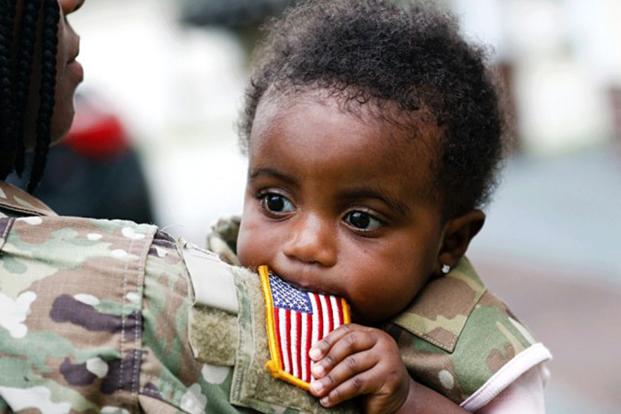Women in the Army now will be excused from wearing dress uniforms for up to a year after giving birth, according to a new service policy reviewed by Military.com.
There had been no specific guidance before on how long female soldiers had after a pregnancy to squeeze into a dress uniform. Now, they can wear Army combat and maternity uniforms in lieu of dress uniforms -- and they can't be penalized for appearing in those uniforms at promotion boards, Army policy says.
"This gives a reasonable amount of time to get [Army service uniforms] back on and not have to buy a different uniform," Sgt. Maj. Ashleigh Sykes, the Army's G-1 Uniform Policy Branch sergeant major, told Military.com.
The move follows a change in March that extended the timeline for new mothers to meet the Army's strict weight standards from 180 days to a full year, Sykes said.
At the time, Sergeant Major of the Army Michael Grinston called it a "common sense" decision.
Read Next: Army Women Are Being Harangued over Hair as Superiors Ignore New Rules
Female officers and enlisted members may choose to wear a dress uniform sooner than 365 days after giving birth, but "no favorable or unfavorable action" is allowed to be taken on the woman's decision to wear or not wear a dress uniform, according to the policy.
That includes allowing postpartum women to appear before enlisted promotion boards in combat or maternity uniforms. The boards typically are conducted in dress uniforms.
"Normally when you go to a promotion board, you wear your service uniform, but if you're coming from maternity leave and three months in, a leader can't say you cannot go to your promotion board," Sykes said. "We are not going to hinder soldiers from going to a promotion board."
Maj. Sam Winkler, an adjutant general officer serving in the 4th Cavalry Brigade, First Army Division East, said that women, especially junior enlisted soldiers, were pressured to spend enormous amounts of money on buying or altering dress uniforms they could fit into after giving birth.
"It was junior soldiers telling us they had to buy multiple uniforms or have them drastically altered for arbitrary reasons," said Winkler, who helped propose the new policy changes and is an administrator for the Army Mom Life Facebook group, which advocates for women-friendly policies in the force.
The Army Mom Life group surveyed nearly 3,000 female service members and found the policy change was a top request among troops. Respondents said the Army put a lot of pressure on women to fit into dress uniforms right after pregnancy, especially for promotion boards, and for other occasions such as random inspections or ceremonies.
In some cases, leaders on promotion boards were allowing women to bring their dress uniform in on a hanger for inspection. But Winkler said other leaders said they needed a rule written down.
Female soldiers on active duty are issued three sets of maternity uniforms, while National Guard and Reserve units are required to issue two sets of uniforms, according to Army rules.
Giving new and expecting mothers more flexibility to meet weight standards is one of several new Army policies aimed at making rules more reasonable for women, who make up about 15% of the force. For example, the Army recently has allowed women to wear their hair in ponytails and braids so combat gear such as helmets fit better.
Also, soldiers who have undergone medical procedures, such as having to wear a cast, cannot be ordered to wear the combat or dress uniform if doing so is difficult or impossible. Instead, they may wear a physical training uniform for as long as a medical provider allows.
-- Steve Beynon can be reached at Steve.Beynon@military.com. Follow him on Twitter @StevenBeynon.
Related: 'They Actually Listened:' Mothers in Uniform React to the Army's New Postpartum Policy













